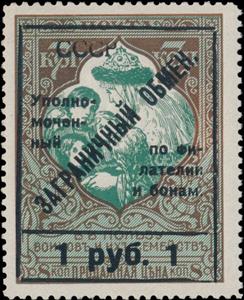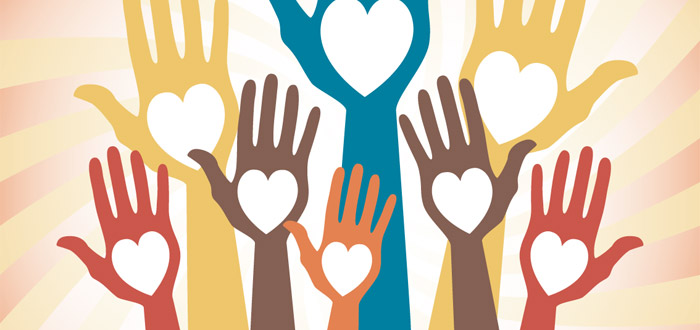Stamp: Allegory: Mother Russia Patronizes the Orphans of War (Soviet Union, USSR 1925)
Allegory: Mother Russia Patronizes the Orphans of War (Soviet Union, USSR 1925)
01 January (Soviet Union, USSR ) within release Exchange Control goes into circulation Stamp Allegory: Mother Russia Patronizes the Orphans of War face value 1 Russian ruble
| Stamp Allegory: Mother Russia Patronizes the Orphans of War in catalogues | |
|---|---|
| Michel: | Mi: SU TK14 |
| Yvert et Tellier: | Yt: SU US14 |
Stamp is square format.
Unissued - Used examples are not known. 7 kopek charity stamp of 1915 surcharged "СССР уполно-мочен-ный ЗАГРАНИЧНЫЙ ОБМЕН. по фи-лателии и бонам. 1 руб. 1" in black This is a revenue stamp which was used to pay a tax on stamp exchanges carried out through the Soviet Philatelic Association. It was affixed to incoming or outgoing envelopes containing stamps and it would receive a violet or black rectangular cancel. Listed under "Gebühren für Briefmarken-Tauschsendungen" (Fees for postage stamp exchanges) in Michel, "Timbres d'Usage Spécial" (special usage stamps) in Yvert and "Exchange Control" in Barefoot.Also in the issue Exchange Control:
- Stamp - Allegory: Mother Russia Patronizes the Orphans of War face value 1;
- Stamp - Farewell to the Don Cossack face value 1;
- Stamp - Farewell to the Don Cossack face value 1;
- Stamp - St. George the Victorious, Slaying the Dragon face value 75;
- Stamp - Ancient Russian Knight, Bogatyr Ilya Muromets - Surch & Opt face value 5;
- Stamp - Ancient Russian Knight, Bogatyr Ilya Muromets - Surch & Opt face value 15;
- Stamp - Ancient Russian Knight, Bogatyr Ilya Muromets - Surch & Opt face value 50;
- Stamp - Farewell to the Don Cossack - Surch & Opt face value 10;
- Stamp - Farewell to the Don Cossack - Surch & Opt face value 1;
- Stamp - Farewell to the Don Cossack - Surch & Opt face value 1;
- Stamp - Mother Russia Patronizes the Orphans of War - Surch & Opt face value 25;
- Stamp - St. George the Victorious, Slaying the Dragon - Surch & Opt face value 75;
Stamp Allegory: Mother Russia Patronizes the Orphans of War it reflects the thematic directions:
An army, ground force or land force is an armed force that fights primarily on land. In the broadest sense, it is the land-based military branch, service branch or armed service of a nation or country. It may also include aviation assets by possessing an army aviation component. Within a national military force, the word army may also mean a field army.
The caduceus (☤; /kəˈdjuːʃəs, -siəs/; Latin: cādūceus, from Greek: κηρύκειον kērū́keion "herald's wand, or staff")[b] is the staff carried by Hermes in Greek mythology and consequently by Hermes Trismegistus in Greco-Egyptian mythology. The same staff was borne by other heralds like Iris, the messenger of Hera. The short staff is entwined by two serpents, sometimes surmounted by wings. In Roman iconography, it was depicted being carried in the left hand of Mercury, the messenger of the gods.
help, especially in the form of money, given freely to people who are in need, for example because they are ill, poor, or have no home, and organizations that provide this help: She does a lot of work for charity.
Biologically, a child (plural: children) is a human being between the stages of birth and puberty. The legal definition of child generally refers to a minor, otherwise known as a person younger than the age of majority. Child may also describe a relationship with a parent (such as sons and daughters of any age) or, metaphorically, an authority figure, or signify group membership in a clan, tribe, or religion; it can also signify being strongly affected by a specific time, place, or circumstance, as in "a child of nature" or "a child of the Sixties". There are many social issues that affect children, such as childhood education, bullying, child poverty, dysfunctional families, child labor, hunger, and child homelessness. Children can be raised by parents, by fosterers, guardians or partially raised in a day care center.
Family (from Latin: familia) is a group of people related either by consanguinity (by recognized birth) or affinity (by marriage or other relationship). It forms the basis for social order. The purpose of the family is to maintain the well-being of its members and of society.[according to whom?] Ideally, families offer predictability, structure, and safety as members mature and learn to participate in the community. Historically, most human societies use family as the primary purpose of attachment, nurturance, and socialization
World War I or the First World War (28 July 1914 – 11 November 1918), also known as the Great War, was a global conflict between two coalitions: the Allies (or Entente) and the Central Powers. Main areas of conflict included Europe and the Middle East, as well as parts of Africa and the Asia-Pacific. There were important developments in weaponry including tanks, aircraft, artillery, machine guns, and chemical weapons. One of the deadliest conflicts in history, it resulted in an estimated 30 million military casualties, plus another 8 million civilian deaths from war-related causes and genocide. The movement of large numbers of people was a major factor in the deadly Spanish flu pandemic.
Philately (/fɪˈlætəli/; fih-LAT-ə-lee) is the study of postage stamps and postal history. It also refers to the collection and appreciation of stamps and other philatelic products.While closely associated with stamp collecting and the study of postage, it is possible to be a philatelist without owning any stamps. For instance, the stamps being studied may be very rare or reside only in museums.
A woman is an adult female human. Before adulthood, a woman is referred to as a girl (a female child or adolescent)







